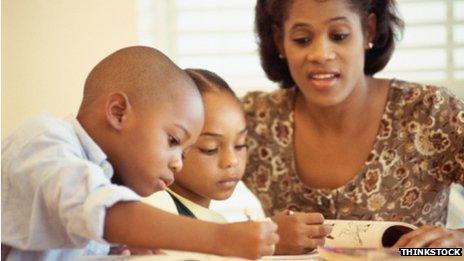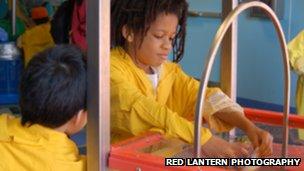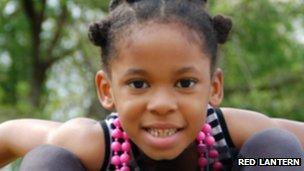Home schooling: Why more black US families are trying it
- Published

Until recently, home schooling in the US was mostly practised by white families, but a growing number in the black community are now also turning their back on the public school system and educating their children at home. Why?
"There were lots of fights and people getting shot," says Sonya Barbee.
"It was just too much. To me, it's not a good environment for a kid and even though I work full time, so it's really hard for me, I still feel like it's the right decision."
Sonya has not made life easy for herself. A single mother, who works for the US government, she now has the added burden of being a teacher to her 11-year-old son, Copeland.
It was not the violence, or even the fact that he was being bullied, that finally led to the decision to remove Copeland from his public school in what she describes as a "really bad area" of Washington DC, but the fact that he was "losing his love of learning".
Now, with the help of her mother, who looks after Copeland two days a week while he works online, and a home schooling co-operative, she is hoping to "rekindle the fire". She herself teaches him after work and in the holidays.
Her only regret so far is that Copeland is not more enthusiastic, saying he misses the "madness" of the classroom - although, she stresses, it is early days.
Until recently, Sonya's story would have been highly unusual in the United States.
About two million, or 4%, of American children are home-schooled, according to the National Home Education Research Institute (NHERI) - a rough estimate, as families do not have to register with the authorities in some states.
But home-schooling has traditionally been dominated by white Christian families in the rural south, who object to what they see as the public schools' liberal agenda on sex education and Darwinism.
The number of inner-city parents choosing to educate their children at home, for educational rather than religious reasons, has been growing for a while, but until recently few black families were thought to be among them, according to NHERI director Dr Brian Ray.
"For the African-American community there was a huge amount of pressure against it, because in America, the grandparents of today's home-schooled children fought for desegregation of schools. They thought, 'The public schools are going to save us,'" he says.
But Dr Ray, who regularly interviews black home-schoolers as part of his research, says attitudes are changing fast - and it's also a lot easier today for black families to try it than it was 20 years ago, he points out.
Joyce Burges, co-founder of National Black Home Educators, who home-schooled all five of her children, aged 16 to 35, says the practice is growing "exponentially" in the African American community.
"The failings of public schools have caused all of us, whether we are white or black, to come up with creative ideas about how we can educate children.

Museum trips are a big part of the home schooling experience
"That explains the rise of the co-ops and African Americans seeing that this is not just a white thing any more."
Despite the desegregation of schools, the attainment gap between African-American and white students in American schools has barely changed since the 1960s. The problem is particularly acute among black boys.
According to a 2008 study by the Schott Foundation: "Over the last 25 years, the social, educational and economic outcomes for black males have been more systematically devastating than the outcomes for any other racial or ethnic group or gender."
Monica Utsey, who runs a home schooling co-operative for African American children in Washington DC, says: "African-American mothers, especially those who have boys, have a lot of trouble in the school system. The way the classroom is designed is more conducive for girls."
For her, though, the main motivation was cultural - she wanted her sons to learn about their African roots and not "to believe that their history begins with slavery".

Home-schooled children, like Sia Li Wright, are given more freedom to grow, parents claim
Home-schoolers are scathing about the way public schools teach to the test, at the expense of providing what they see as a rounded education.
Another common complaint is that teachers are too ready to blame behavioural problems on Attention Deficit Hyperactivity Disorder (ADHD), and encourage them to medicate their children with drugs such as Ritalin or Adderall.
"The teachers are always telling the parents they have to drug their kids, like they have some kind of problem. It's just crazy." says Sonya Barbee. "You don't want your kid to be a zombie."
Home-schooling co-operatives, where lessons are held in mixed age groups by parents, have sprung up in cities across America in recent years, helping to break the social isolation critics of home schooling often warn about.
But even its most ardent advocates concede that home schooling is not for everyone.
Only the most committed parents, who want to be involved in every aspect of their child's development and enjoy spending time with them, can make it work.
Not all parents can keep up with the demands of the curriculum, particularly if they want their offspring to go to college. Many children who are home-schooled in their early years return to the class room when they reach secondary school age.
It is also does nothing to address standards in public schools which, some experts say, will fall still further if highly-motivated and engaged parents start taking their children out of them, harming the African-American community as a whole.
Joyce Burges believes the day could soon be approaching when the local home-schooling co-operative, run by a group of committed parents, could be a real alternative to the public school, for children of all ages and ethnicities.
The demand certainly appears to be there.
"I get emails and phone calls from people all the time who want to know if there is someone that can home-school their child," says Monica Utsey. "I tell them that it doesn't work like that. It's really the parents' responsibility."